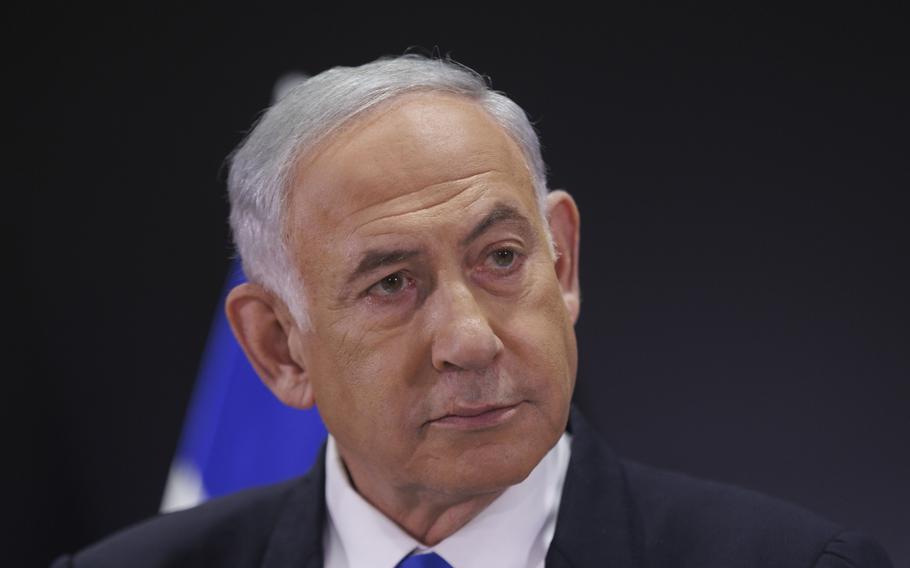
Israeli Prime Minister Benjamin Netanyahu. Palestinian officials have begun discussions with the U.S. and Saudi Arabia about what concessions they might get from any normalization of ties between the kingdom and Israel. (Kobi Wolf/Bloomberg)
Palestinian officials have begun discussions with the U.S. and Saudi Arabia about what concessions they might get from any normalization of ties between the kingdom and Israel.
It’s a changed tack from the Palestinian leadership, which spurned involvement in talks three years ago that saw Israel establish formal relations with the United Arab Emirates, Bahrain and Morocco.
Aides to Palestinian President Mahmoud Abbas have laid out a series of requests in meetings with U.S. and Saudi officials, according to several people with knowledge of the talks. These include a freeze on Jewish settlements in the West Bank, the reopening of the Palestine Liberation Organization office in Washington, full membership in the United Nations and Saudi financial support, according to the people.
The talks are happening as the U.S. and Israeli governments push for what would be a historic deal between Saudi Arabia and Israel, potentially reshaping Middle Eastern geopolitics.
Washington is in negotiations with the Saudis that may eventually see them recognize Israel in exchange for U.S. security commitments and American help with the construction of nuclear power plants. Riyadh has also sought concessions to the Palestinians from Israel’s government.
The talks are fraught with complications and a deal between Israel and Saudi Arabia is far from certain. The U.S. recently said there’s a long way to go.
The U.S. State Department didn’t immediately respond to a request for comment from Bloomberg. The National Security Council said it would not negotiate in public, adding, “While we have engaged constructively to see what’s possible, there’s a long way to travel on this set of issues.”
On Monday, Israeli national security adviser Tzachi Hanegbi said the Palestinians had been “very proactive.”
“They are talking to the Americans, to us, to the Saudis,” he said at a conference in Israel on security.
Israel is “very much in favor of there being a significant Palestinian component within the clear boundaries that the prime minister set,” he added, without explaining further.
Israeli Prime Minister Benjamin Netanyahu has said Israel will do nothing that may harm its security, and many members of his far-right coalition are against any concessions to the Palestinians.
U.S. officials have urged the Palestinians to be realistic, according to several of the people with knowledge of the talks. At the same time, the administration of President Joe Biden hopes a Saudi deal will yield real benefits for the Palestinians, they said.
“The internal analysis of the Palestinians is that the likelihood of this happening is not high,” said Ghassan Khatib, a political scientist and former Palestinian government minister. “They don’t want to lower their demands for nothing. The best might be to stand aside, avoid criticizing it, but not be part of it.”
The Palestinians’ requests are preliminary and informal, and many of their officials remain skeptical, several of the people said. Their public stance is that they will accept nothing less than a two-state solution based on 1967 borders, in keeping with the two-decade-old Arab Peace Initiative.
Still, as one Palestinian official put it after this weekend’s Group of 20 summit, where plans were announced for a rail-and-maritime corridor from India to Europe via Saudi Arabia and Israel, everyone must find a place in the new world order. The Palestinians are no exception, the official said.
Saudi Arabia is different from the Arab states that Israel signed accords with in 2020. It’s the Middle East’s biggest economy and Netanyahu has consistently talked of how normalization with the kingdom would bolster his country’s security, including by discouraging Iranian aggression against Israel.
The Saudis are also the originators of the Arab Peace Initiative from 2002, and they’ve shown sympathy for the Palestinian national cause for years.
One Palestinian request that’s been met is the assigning of a Saudi diplomat. Last month, the Saudi ambassador to Jordan, Nayef al-Sudairi, expanded his portfolio to include the Palestinians. He’s been meeting regularly with Palestinian officials and business leaders.
The biggest Palestinian need is a substantial Saudi injection of funds. The Saudis began cutting their aid to the Palestinian Authority in 2016 over allegations of incompetence and corruption and stopped entirely in 2021.
The Palestinian Authority and the U.N. agency running Palestinian refugee camps are running out of cash. There have been strikes by teachers, court employees and doctors, including over unpaid salaries. The Saudis have expressed willingness to restore substantial aid.
Many other requests — such as moving beyond observer status at the U.N. to full membership — have been played down by U.S. officials, according to the people with knowledge of their talks with the Palestinians. One complicated factor is that the U.S. Congress bars American funding for any U.N. agency that grants the PLO the standing of a member state.
It’s also far from clear whether Israel would consider curbs on settlements or any land transfers, which is another Palestinian request.
Netanyahu has, moreover, said Israeli-Saudi relations will deepen even if the two don’t recognize each other formally.
He told Bloomberg last month that the Palestinian issue was a mere “check box.”
“You have to check it to say you’re doing it,” he said. “Is that what’s being said in corridors? Is that what’s being said in discreet negotiations? The answer is a lot less than you think.”
Marissa Newman contributed to this report.